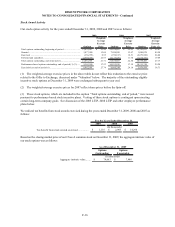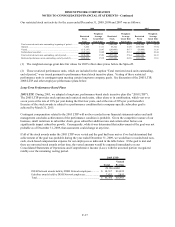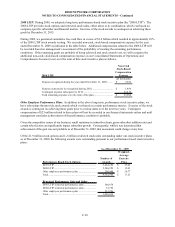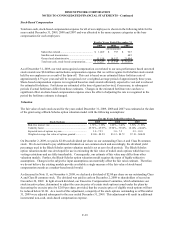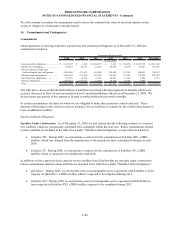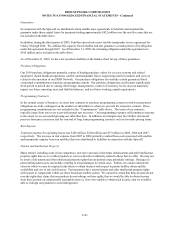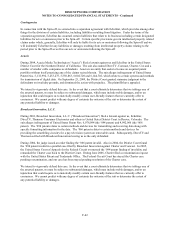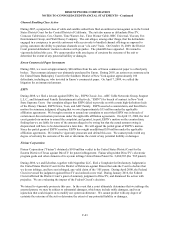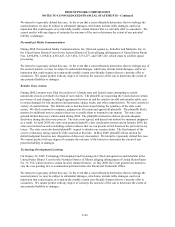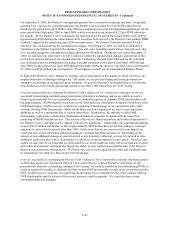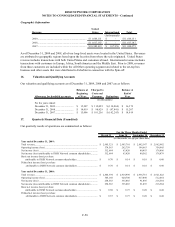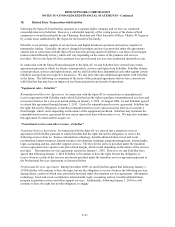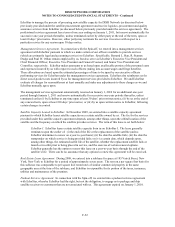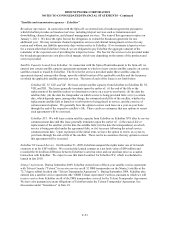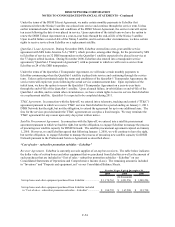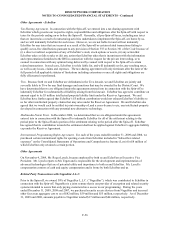Dish Network 2009 Annual Report Download - page 136
Download and view the complete annual report
Please find page 136 of the 2009 Dish Network annual report below. You can navigate through the pages in the report by either clicking on the pages listed below, or by using the keyword search tool below to find specific information within the annual report.DISH NETWORK CORPORATION
NOTES TO CONSOLIDATED FINANCIAL STATEMENTS - Continued
F-46
Tivo Inc.
During January 2008, the United States Court of Appeals for the Federal Circuit affirmed in part and reversed
in part the April 2006 jury verdict concluding that certain of our digital video recorders, or DVRs, infringed a
patent held by Tivo. As of September 2008, we had recorded a total reserve of $132 million on our
Consolidated Balance Sheets to reflect the April 2006 jury verdict, supplemental damages through September
2006 and pre-judgment interest awarded by the Texas court, together with the estimated cost of potential further
software infringement prior to implementation of our alternative technology, discussed below, plus interest
subsequent to entry of the judgment. In its January 2008 decision, the Federal Circuit affirmed the jury’s
verdict of infringement on Tivo’s “software claims,” and upheld the award of damages from the District Court.
The Federal Circuit, however, found that we did not literally infringe Tivo’s “hardware claims,” and remanded
such claims back to the District Court for further proceedings. On October 6, 2008, the Supreme Court denied
our petition for certiorari. As a result, approximately $105 million of the total $132 million reserve was
released from an escrow account to Tivo.
We also developed and deployed “next-generation” DVR software. This improved software was automatically
downloaded to our current customers’ DVRs, and is fully operational (our “original alternative technology”).
The download was completed as of April 2007. We received written legal opinions from outside counsel that
concluded our original alternative technology does not infringe, literally or under the doctrine of equivalents,
either the hardware or software claims of Tivo’s patent. Tivo filed a motion for contempt alleging that we are
in violation of the Court’s injunction. We opposed this motion on the grounds that the injunction did not apply
to DVRs that have received our original alternative technology, that our original alternative technology does
not infringe Tivo’s patent, and that we were in compliance with the injunction.
In June 2009, the United States District Court granted Tivo’s motion for contempt, finding that our original
alternative technology was not more than colorably different than the products found by the jury to infringe
Tivo’s patent, that the original alternative technology still infringed the software claims, and that even if the
original alternative technology was “non-infringing,” the original injunction by its terms required that we
disable DVR functionality in all but approximately 192,000 digital set-top boxes in the field. The District
Court awarded Tivo $103 million in supplemental damages and interest for the period from September 2006
through April 2008, based on an assumed $1.25 per subscriber per month royalty rate. We posted a bond to
secure that award pending appeal of the contempt order.
On July 1, 2009, the Federal Circuit Court of Appeals granted a permanent stay of the District Court’s contempt
order pending resolution of our appeal. In so doing, the Federal Circuit found, at a minimum, that we had a
substantial case on the merits. Oral argument on our appeal of the contempt ruling took place on November 2,
2009 before three judges of the Federal Circuit.
The District Court held a hearing on July 28, 2009 on Tivo’s claims for contempt sanctions, but has ordered
that enforcement of any sanctions award will be stayed pending our appeal of the contempt order. Tivo sought
up to $975 million in contempt sanctions for the period from April 2008 to June 2009 based on, among other
things, profits Tivo alleges we made from subscribers using DVRs. We opposed Tivo’s request arguing,
among other things, that sanctions are inappropriate because we made good faith efforts to comply with the
Court’s injunction. We also challenged Tivo’s calculation of profits.
On August 3, 2009, the Patent and Trademark Office (the “PTO”) issued an initial office action rejecting the
software claims of United States Patent No. 6,233,389 (the ‘389 patent) as being invalid in light of two prior
patents. These are the same software claims that we were found to have infringed and which underlie the
contempt ruling now pending on appeal. We believe that the PTO’s conclusions are relevant to the issues on
appeal as well as the pending sanctions proceedings in the District Court. The PTO’s conclusions support our
position that our original alternative technology is more than colorably different than the devices found to
infringe by the jury; that our original alternative technology does not infringe; and that we acted in good faith to
design around Tivo’s patent.


